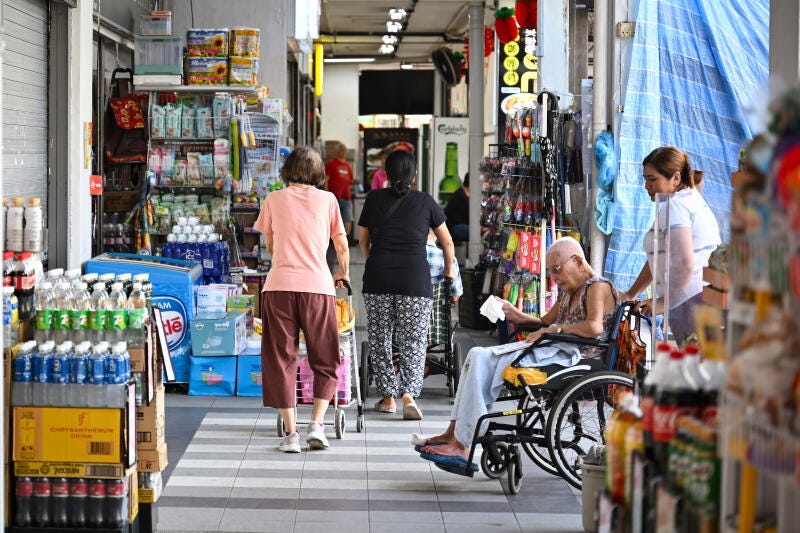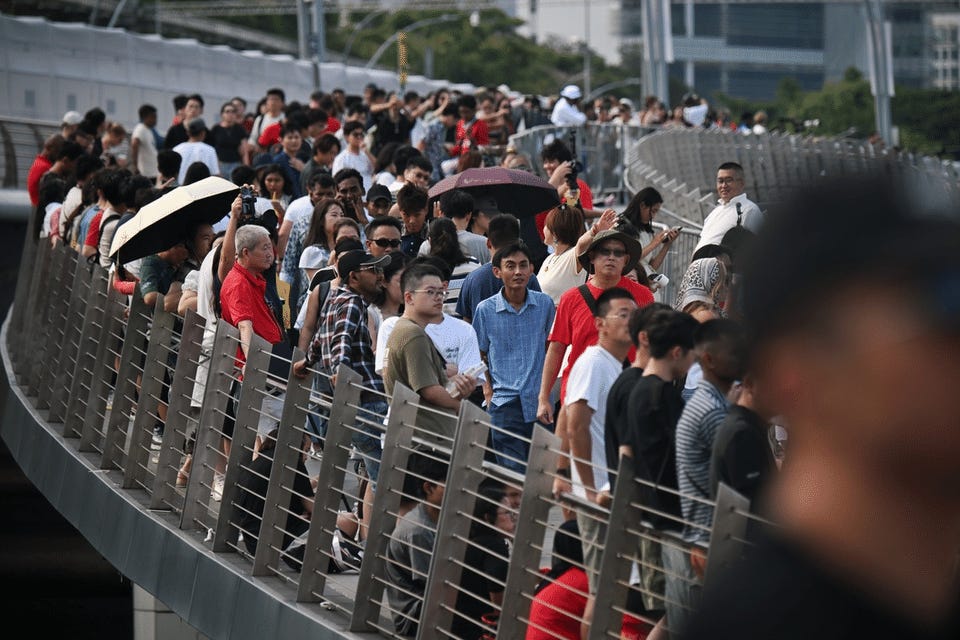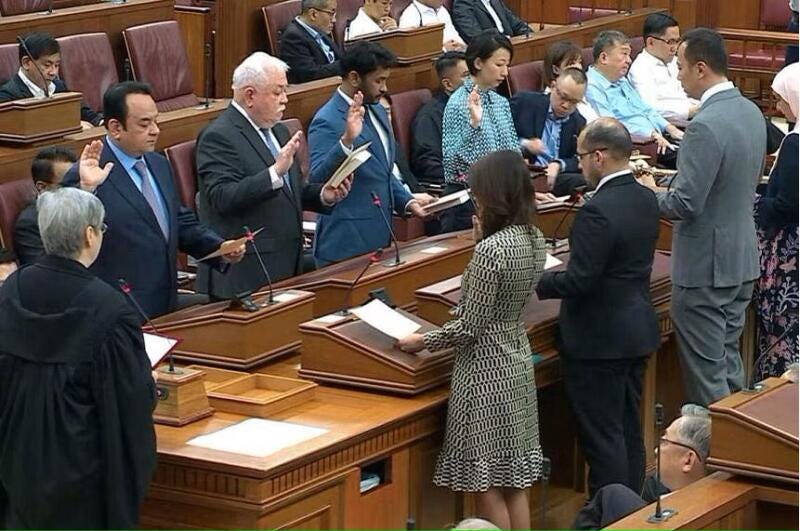Pondering the population Pandora's box
Immigration, ageing, and birth rates continue to be issues to watch
Hi everyone,
Last week we got some national population statistics, as well as updates from Parliament which may impact the next set of people who will enter the House through selection, rather than election: the Nominated MPs.
We’re a week out from the second sitting of the term scheduled for Oct 14. A two-week interval is about as close as two sittings will get, as the minimum period between the introduction of a Bill and when it comes up for debate (known as the second reading) is 10 days.
Parliament is likely balancing between the start of a new government term and the end of the calendar year, as there’s plenty to get through if the House is to take its usual December break (there are five Bills slated for the next sitting).
On the October agenda are some changes to laws related to CareShield Life, after the Government accepted a council’s recommended changes to the national disability insurance scheme in August. There’s another Bill that would empower the Civil Aviation Authority of Singapore to collect a sustainable aviation fuel levy as part of the push to require flights departing from Singapore to use such fuel.
It will also be PAP newcomer Syed Harun Alhabsyi’s first sitting as a political office-holder – he was sworn in to his role as Senior Parliamentary Secretary for Education and National Development on Oct 3.
While the order paper is not out yet, we expect some questions from MPs on race and religion, following the incident where what appeared to be pork was sent to a mosque in Serangoon North. We could also see more questions related to social mobility, the latest political buzzword following the President’s Address and its subsequent debate. Wei Kai and our colleague Yuen-C have put together a piece looking at this topic, covering Singaporeans’ hopes that each generation will fare better than the one before.
(Also, want to meet us? Find out more details at the end of today’s issue.)
Let’s get into last week:
There are slightly more people in Singapore
The news: Some 6.11 million people are living in Singapore, said the most recent statistics from June 2025 – 1.2 per cent more than the year before.
Growth largely came from an increase in the group of people classified as the non-resident population – such as work permit holders in the construction sector and domestic helpers. The National Population and Talent Division released the Population in Brief 2025 report on Sept 29.
It confirmed the continuation of trends we have seen over the past years: growing numbers of singles and seniors.
Singapore is on track to hit super-aged status in 2026, a UN marker for when 21 per cent or more of a country’s population is aged 65 and older.
The take: The numbers show that the government has continued to hold steady its policy on immigration, which has been a hot-button and often politicised issue – most famously after the 2013 population white paper.
Then, the Government released a paper recommending that Singapore plan its infrastructure around accommodating a projected 6.5 to 6.9 million people amid falling birthrates and a shrinking workforce.
Backlash from the public and the opposition was immense, and the Government promised to moderate the inflow.
Population numbers from recent years (including this one) show that we are unlikely to reach anywhere near 6.9 million people on the island by 2030, and are unlikely to hit the lower end of the band at 6.5 million either (see this reply from Minister in the Prime Minister’s Office Indranee Rajah from the last Parliament).
While the political problems of immigration seem to have been arrested, the underlying issues remain the same or even worse: fertility remains low and ageing is even more pressing than before. These are challenges to growth as there are simply fewer people in the “Singaporean core” to fuel the economy. These two issues have been the focus of policy and messaging for the past few years, and it seems this will continue.
NMP selection begins
The news: The eight-member committee of MPs that will select the next batch of Nominated MPs has been formed.
Chaired by Speaker of Parliament Seah Kian Peng, the committee comprises Leader of the House Indranee Rajah, Ministers Chan Chun Sing and Desmond Lee, Senior Ministers of State Janil Puthucheary, Sim Ann and Zaqy Mohamad as well as Workers’ Party MP Louis Chua.
Indranee and Chan return, while the rest are fresh to the Special Select Committee of Parliament.
Up to nine NMPs can be selected for a 2½ -year term.
The take: The formation of this committee, in line with usual timelines and procedures, indicates the NMP scheme is most likely to continue in its current form, despite calls from some quarters for the scheme to be reviewed.
Concerns about the scheme’s impartiality were raised after two NMPs – Syed Harun Alhabsyi and Raj Joshua Thomas – resigned in February ahead of the general election to join the men in white. This included a letter from 16 former NMPs to Prime Minister Lawrence Wong urging a rethink of the scheme.
Syed Harun is now an office-holder and Nee Soon GRC MP, while Thomas did not contest but is serving in a PAP branch in Sembawang.
We’ll be watching the number of applicants this round, as the last selection process in 2023 saw just 30 names put up for consideration, a marked drop from previous rounds (and the lowest since the second session of the ninth Parliament).
We’ll also keep tabs on continued discourse on the scheme’s relevance and political impartiality – former NMP Anthea Ong last month announced a continuation of a survey on the scheme which she has been working on.
Former WP politician Tang Liang Hong died aged 90 in Hong Kong. Tang, who contested in Cheng San GRC in 1997 (he was also an NMP hopeful in 1992), was during the election accused by the PAP of being an anti-Christian Chinese chauvinist, which he denied. His name has been brought up over the years by the PAP in relation to playing the race card in politics, and also by observers as an example of the knuckleduster politics the ruling party used to practise.
After seven years of legal tussle that concluded in July 2024, WP leaders Pritam Singh, Sylvia Lim and former chief Low Thia Khiang have closed a bank account they had set up to fundraise for their Aljunied-Hougang Town Council case. They said last week that they had donated the remaining $5,826.14 to the party’s Community Fund, a registered charity.
WP newcomers Fadli Fawzi and Kenneth Tiong reiterated the party’s position on the opposition’s role in the House in an appearance on ST’s The Usual Place podcast. They also discussed the preparations for their maiden speeches, and their sense of the tone of debate in this new parliamentary term.
Would you like to meet us? (YH only though, WK will be on a work trip.) We’d love to meet you.
Unpacked will be part of an upcoming session of Conversations with The Straits Times, a series of in-person events that ST started this year to have open chats with readers.
You’re invited to the next one coming up on Nov 1 :)
We’d love to hear your thoughts on Unpacked and what you’d like to see.
Have brunch and coffee on us, plus some other activities we’re planning. You’ll also get to meet ST editor Jaime Ho and other members of the newsroom. Feel free to ask them anything; nothing is off limits.
If you’re available on Saturday Nov 1 from 11am to 2.30pm, sign up here: str.sg/STconvos
See you then!










